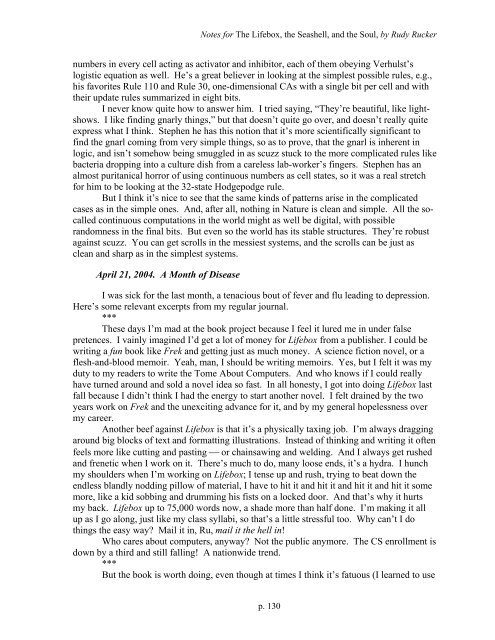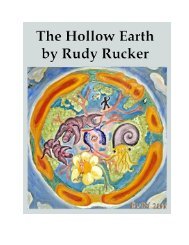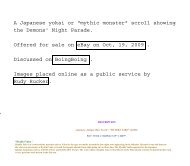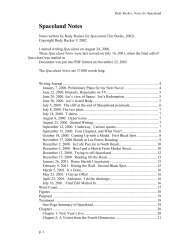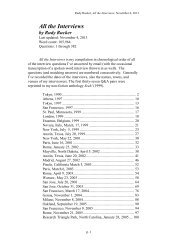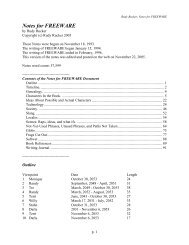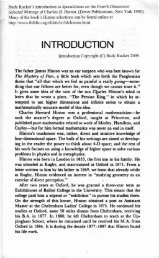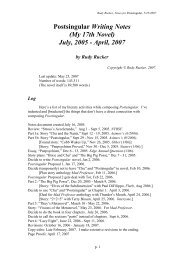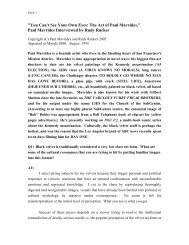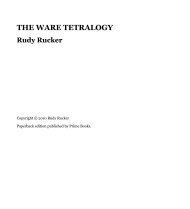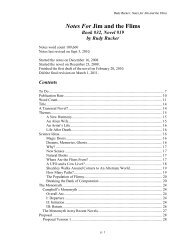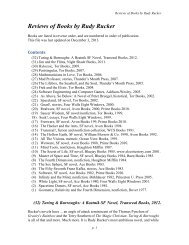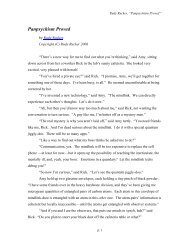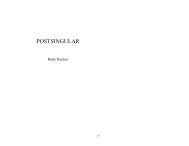Notes for the Lifebox, the Seashell, and the Soul - Rudy Rucker
Notes for the Lifebox, the Seashell, and the Soul - Rudy Rucker
Notes for the Lifebox, the Seashell, and the Soul - Rudy Rucker
You also want an ePaper? Increase the reach of your titles
YUMPU automatically turns print PDFs into web optimized ePapers that Google loves.
<strong>Notes</strong> <strong>for</strong> The <strong>Lifebox</strong>, <strong>the</strong> <strong>Seashell</strong>, <strong>and</strong> <strong>the</strong> <strong>Soul</strong>, by <strong>Rudy</strong> <strong>Rucker</strong><br />
numbers in every cell acting as activator <strong>and</strong> inhibitor, each of <strong>the</strong>m obeying Verhulst’s<br />
logistic equation as well. He’s a great believer in looking at <strong>the</strong> simplest possible rules, e.g.,<br />
his favorites Rule 110 <strong>and</strong> Rule 30, one-dimensional CAs with a single bit per cell <strong>and</strong> with<br />
<strong>the</strong>ir update rules summarized in eight bits.<br />
I never know quite how to answer him. I tried saying, “They’re beautiful, like lightshows.<br />
I like finding gnarly things,” but that doesn’t quite go over, <strong>and</strong> doesn’t really quite<br />
express what I think. Stephen he has this notion that it’s more scientifically significant to<br />
find <strong>the</strong> gnarl coming from very simple things, so as to prove, that <strong>the</strong> gnarl is inherent in<br />
logic, <strong>and</strong> isn’t somehow being smuggled in as scuzz stuck to <strong>the</strong> more complicated rules like<br />
bacteria dropping into a culture dish from a careless lab-worker’s fingers. Stephen has an<br />
almost puritanical horror of using continuous numbers as cell states, so it was a real stretch<br />
<strong>for</strong> him to be looking at <strong>the</strong> 32-state Hodgepodge rule.<br />
But I think it’s nice to see that <strong>the</strong> same kinds of patterns arise in <strong>the</strong> complicated<br />
cases as in <strong>the</strong> simple ones. And, after all, nothing in Nature is clean <strong>and</strong> simple. All <strong>the</strong> socalled<br />
continuous computations in <strong>the</strong> world might as well be digital, with possible<br />
r<strong>and</strong>omness in <strong>the</strong> final bits. But even so <strong>the</strong> world has its stable structures. They’re robust<br />
against scuzz. You can get scrolls in <strong>the</strong> messiest systems, <strong>and</strong> <strong>the</strong> scrolls can be just as<br />
clean <strong>and</strong> sharp as in <strong>the</strong> simplest systems.<br />
April 21, 2004. A Month of Disease<br />
I was sick <strong>for</strong> <strong>the</strong> last month, a tenacious bout of fever <strong>and</strong> flu leading to depression.<br />
Here’s some relevant excerpts from my regular journal.<br />
***<br />
These days I’m mad at <strong>the</strong> book project because I feel it lured me in under false<br />
pretences. I vainly imagined I’d get a lot of money <strong>for</strong> <strong>Lifebox</strong> from a publisher. I could be<br />
writing a fun book like Frek <strong>and</strong> getting just as much money. A science fiction novel, or a<br />
flesh-<strong>and</strong>-blood memoir. Yeah, man, I should be writing memoirs. Yes, but I felt it was my<br />
duty to my readers to write <strong>the</strong> Tome About Computers. And who knows if I could really<br />
have turned around <strong>and</strong> sold a novel idea so fast. In all honesty, I got into doing <strong>Lifebox</strong> last<br />
fall because I didn’t think I had <strong>the</strong> energy to start ano<strong>the</strong>r novel. I felt drained by <strong>the</strong> two<br />
years work on Frek <strong>and</strong> <strong>the</strong> unexciting advance <strong>for</strong> it, <strong>and</strong> by my general hopelessness over<br />
my career.<br />
Ano<strong>the</strong>r beef against <strong>Lifebox</strong> is that it’s a physically taxing job. I’m always dragging<br />
around big blocks of text <strong>and</strong> <strong>for</strong>matting illustrations. Instead of thinking <strong>and</strong> writing it often<br />
feels more like cutting <strong>and</strong> pasting ⎯ or chainsawing <strong>and</strong> welding. And I always get rushed<br />
<strong>and</strong> frenetic when I work on it. There’s much to do, many loose ends, it’s a hydra. I hunch<br />
my shoulders when I’m working on <strong>Lifebox</strong>; I tense up <strong>and</strong> rush, trying to beat down <strong>the</strong><br />
endless bl<strong>and</strong>ly nodding pillow of material, I have to hit it <strong>and</strong> hit it <strong>and</strong> hit it <strong>and</strong> hit it some<br />
more, like a kid sobbing <strong>and</strong> drumming his fists on a locked door. And that’s why it hurts<br />
my back. <strong>Lifebox</strong> up to 75,000 words now, a shade more than half done. I’m making it all<br />
up as I go along, just like my class syllabi, so that’s a little stressful too. Why can’t I do<br />
things <strong>the</strong> easy way? Mail it in, Ru, mail it <strong>the</strong> hell in!<br />
Who cares about computers, anyway? Not <strong>the</strong> public anymore. The CS enrollment is<br />
down by a third <strong>and</strong> still falling! A nationwide trend.<br />
***<br />
But <strong>the</strong> book is worth doing, even though at times I think it’s fatuous (I learned to use<br />
p. 130


